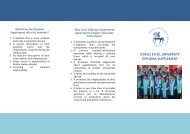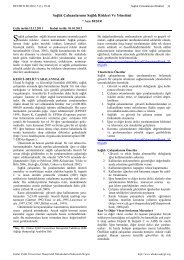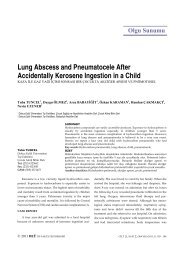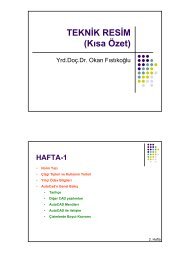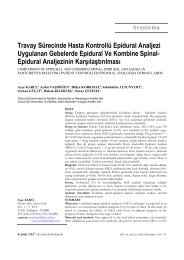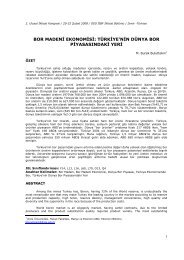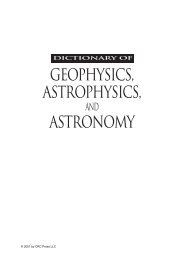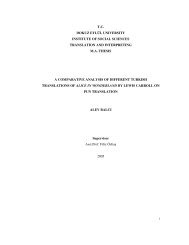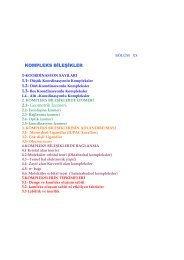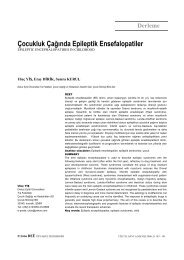the ideology of lexical choices in the turkish translations of oliver twist
the ideology of lexical choices in the turkish translations of oliver twist
the ideology of lexical choices in the turkish translations of oliver twist
Create successful ePaper yourself
Turn your PDF publications into a flip-book with our unique Google optimized e-Paper software.
2.2. The ‘Classics’ <strong>of</strong> Literature and <strong>the</strong> Rationale beh<strong>in</strong>d “100 Essential<br />
Read<strong>in</strong>gs”<br />
2.2.1. Which Works are regarded as ‘Classics’?<br />
In A Handbook to Literature a classic is def<strong>in</strong>ed as “a piece <strong>of</strong> literature that<br />
by common consent has achieved a recognized superior status <strong>in</strong> literary history; also<br />
an author <strong>of</strong> similar stand<strong>in</strong>g” (Harmon and Holman, 1996; 96). Ano<strong>the</strong>r def<strong>in</strong>ition<br />
<strong>of</strong> <strong>the</strong> word is provided by Cambridge Advanced Learner’s Dictionary: a classic is “a<br />
piece <strong>of</strong> writ<strong>in</strong>g, a musical record<strong>in</strong>g or a film which is well-known and <strong>of</strong> a high<br />
standard and last<strong>in</strong>g value” (Woodford, Jackson, and Gillard, 2003; 215). For<br />
example, “Jane Austen’s ‘Pride and Prejudice’ is a classic <strong>of</strong> English Literature”<br />
(ibid.). As <strong>the</strong>se def<strong>in</strong>itions <strong>in</strong>dicate, classics <strong>of</strong> literature are written by reputable<br />
and <strong>the</strong>refore immortal authors; <strong>the</strong>y are well-known and are <strong>of</strong> a superior status and<br />
last<strong>in</strong>g value. Never<strong>the</strong>less, <strong>the</strong> phrase ‘by common consent’ is a bit problematic,<br />
because “not everyone agrees on what <strong>the</strong> classics are”<br />
(http://www.ipl.org.ar/ref/QUE/FARQ/classicsFARQ.html). However, “lots <strong>of</strong><br />
people have created lists <strong>of</strong> what <strong>the</strong>y believe to be <strong>the</strong> most important books”<br />
(ibid.). As Italo Calv<strong>in</strong>o says <strong>in</strong> his work entitled Why Read Classics, it would be<br />
sensible to def<strong>in</strong>e ‘classics’ <strong>in</strong> this way: “The classics are <strong>the</strong> books <strong>of</strong> which we<br />
usually hear people say, ‘I am reread<strong>in</strong>g . . .’ and never ‘I am read<strong>in</strong>g . . .’” (quoted<br />
<strong>in</strong> http://www.des.emory.edu/mfp/calv<strong>in</strong>o/calclassics.html)<br />
2.2.2. The Significance <strong>of</strong> Classics <strong>in</strong> Turkey<br />
2.2.2.1 Why Read Classics?<br />
Classic works, especially those <strong>of</strong> Western orig<strong>in</strong>, have always played an<br />
important role <strong>in</strong> Turkish cultural life. They undoubtedly constitute <strong>the</strong> primary<br />
<strong>in</strong>tellectual ground for <strong>the</strong> Western culture, which has always enjoyed a superior<br />
status <strong>in</strong> Turkey. Naturally, acqua<strong>in</strong>tance <strong>of</strong> Turkish people with Western classics<br />
was only possible through translation. Therefore, translation was <strong>of</strong> utmost<br />
importance. As Berr<strong>in</strong> Aksoy states <strong>in</strong> her article “Translation as Rewrit<strong>in</strong>g: The<br />
Concept and Its Implications on <strong>the</strong> Emergence <strong>of</strong> a National Literature,” “<strong>in</strong>spired<br />
by <strong>the</strong> directives <strong>of</strong> M. Kemal Atatürk, a full-scale translation effort was started <strong>in</strong><br />
order to establish organized and systematic translation activities” (2001; Translation<br />
15




